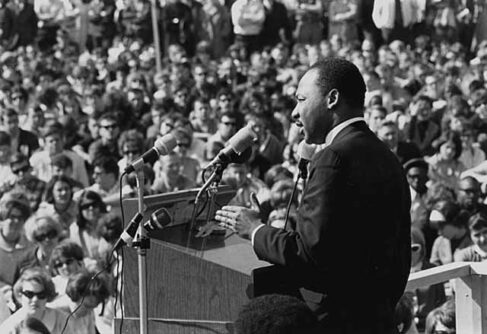To say that Rousseau himself was a colorful figure is an understatement: he wrote a lengthy book on childrearing in which he praised the institution of marriage and lambasted aristocratic women for turning over their infants to the care of wet nurses, but he kept a mistress and arranged for their five children to be placed into foundling homes where they are unlikely to have survived; he converted to Catholicism, which necessitated the surrender of his citizenship in Calvinist Geneva, in early adulthood but then reverted to Calvinism and regained his Genevan citizenship; and when Rousseau’s religious and political writings were burned and his dwelling stoned, he accepted sanctuary in Scotland arranged for him by the philosopher David Hume -- but Hume shortly found Rousseau impossible to manage and published a highly critical report of Rousseau’s conduct.
While today no one calls himself a “Rousseauian,” Rousseau has deeply influenced contemporary America. For example, Rousseau’s book about childrearing, Emile, was taken up by Maria Montessori as the foundation for the Montessori educational program, including more than 4,000 U.S. schools today. And, Rousseau’s notion of the “general will” of the citizens that should direct the state was taken up by the German political philosopher Immanuel Kant. Kant, in turn, strongly influenced the twentieth-century American political philosopher John Rawls’s notion of “justice as fairness.” Rawls’s “justice as fairness” guided many in the last generation of Washington policymakers. President Obama’s frequent invocation of term “fairness” in his reelection campaign has its intellectual origins in Rousseau’s thought, and so Rousseau’s thought is certainly essential to understanding the contemporary American political culture.
But Rousseau’s thought is also of strong interest to philanthropists because he wrote so insightfully about the motives of human behavior in general, and about what motivates philanthropy in particular. Rousseau wrote that there are two natural sentiments that guide human behavior: pity and self-love. Pity, and what Rousseau judged to be an inborn repugnance at the sufferings of fellow men, motivate philanthropy. But this motive is limited by man’s self-love -- and especially by the worst forms of self-love.
Rousseau distinguished between a healthy self-love that encompasses a desire for self-preservation and welfare (he called this amour de soi) and an unhealthy, prideful self-love that encompasses a desire for the esteem and regard of others (he called this amour-propre). Too often, Rousseau wrote, people give charitably only to win the esteem of their fellow wealthy aristocrats rather than truly to help others -- that is, they are motivated by self-love (in the sense of amour-propre) rather than by pity. He had scathing words, for example, for Parisian aristocrats who wept over sufferings portrayed at the theatre and then rode home in their carriages indifferent to the poor Parisians they passed between the theatre and their mansions. Likewise today, it’s easy to be tempted into showy philanthropies by the desire to win the praise and esteem of peers and to miss attending to the genuine needs of those nearby in our neighborhoods.
So while no upright person would take Rousseau as his model of probity and as a guide for personal conduct, Rousseau’s insight into human motives and into true and false philanthropy remains keenly relevant -- just as Rousseau’s political and educational thought continues to influence America today.
Best wishes for a happy Thanksgiving.





